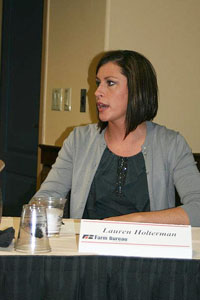By Daniella Silva and Timothy Weisberg
Pavement Pieces staff
MADISON, Wis.- Growing up on dairy farms in rural Wisconsin, Taylor Fritsch and Lauren Holterman were taught the importance of farming and food production at a very young age. Upon leaving their family farms to attend the University of Wisconsin-Madison, the two chose to use their hands-on experience to bring farm issues to the forefront of campus discussions.
Three years ago, Fritsch,20, and Holterman,21, founded the Madison chapter of the Collegiate Farm Bureau as a way to promote student interest in agriculture and professional development in the industry.
“We have to make sure the next generation of farmers and agriculturalists, whether that’s in downtown Madison or in rural areas, are getting exposure to food production and the opportunities that exist,” said Fritsch.
In an increasingly polarized political environment, college students with strong agricultural backgrounds make up another sector of undecided voters during the 2012 presidential election. As a small fragment of the general population, they are unsure about the economic sustainability of America’s food sector and which side of the political pendulum to swing come Election Day.
A native of Dodgeville, Wis., Fritsch grew up on Whitson View Farms, his family’s 600-acre dairy farm that has been in operation for three generations. Like many farm families, Fritsch echoes how much the Farm Bill affects food producers.
“In the short term, I think a lot of farmers in agriculture want to see a Farm Bill,” he said.
The Agricultural Reform, Food and Jobs Act of 2012, or Farm Bill, expired Sept. 30 after an impasse in Congress.
[audio:http://www.youngvote.net/wp-content/uploads/2012/11/Taylor1-Farm-Bill1.mp3]
Taylor on the importance of the Farm Bill
Democrats and Republicans were far apart over funding for subsidized nutrition assistance programs, an integral part of the Farm Bill, a program that also sets standards for subsidies, crop insurance, and milk production.
Historically a bipartisan issue, the inability to pass the bill before Congress’ lame-duck session left many farmers struggling to pick sides, and remains a heated discussion within the community.
Holterman, said the failure of Congress to push through a new Farm Bill is unacceptable. Her family’s 1,200 acre dairy farm, Rosy-Lane Holstein’s LLC, in Watertown, Wis. also goes back generations.
“In general, politics is too polarized at this point,” she said.
[audio:http://www.youngvote.net/wp-content/uploads/2012/11/lauren1.mp3]
Lauren Holterman on Congress working together
Fritsch said he was also disillusioned with this year’s party politics, and that the battle over government subsidies was “a side effect of a challenged economy.” The need for farm programs was lost in the mix, he added.
Taylor on how the Farm Bill should not be partisan issue
Facing one of the worst droughts of their generation without a Farm Bill, there is no longer a government safety net to protect farmers in a time they need it most, said Fritsch.
“Across agriculture it will be a challenging year with food shortages and higher feed prices for dairy farmers,” he said.
[audio:http://www.youngvote.net/wp-content/uploads/2012/11/Taylor-2-audio.mp3]Taylor on the bigger picture of the drought.
While the extent of the drought affected many of Wisconsin’s 72 counties, Holterman’s own corn and alfalfa harvests have been largely unaffected.
“We’re actually surprised at how good the yields were,” she said. “We didn’t expect them to be as good as they were.”
Both students said that despite this year’s setbacks for the industry, the economic prospects for farmers were positive in an overall stagnant economy.
“It’s important to note that even through this great recession, agriculture’s been a really big bright spot,” said Fritsch.
In a state where farming produced $59 billion in revenue in 2011, addressing issues within the food sector remain important for the industry’s long-term sustainability.
Holterman said that as an ever-modernizing industry, “agro-business” provided ample opportunity for young people.
“We need agriculture. Agriculture needs the United States,” Fritsch added. “That’s really what it all comes down to.”
[audio:http://www.youngvote.net/wp-content/uploads/2012/11/Taylor-and-Lauren-Conclusion.mp3]Taylor and Holterman on our “common ground.”

